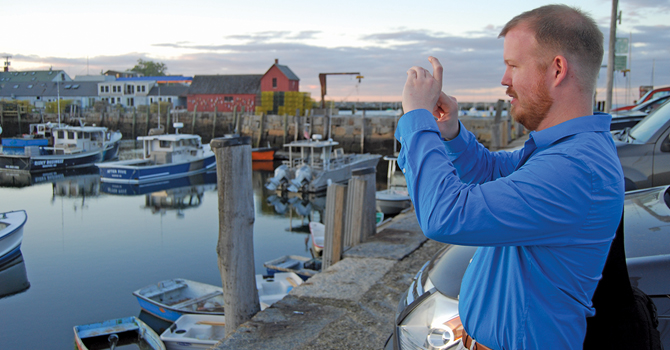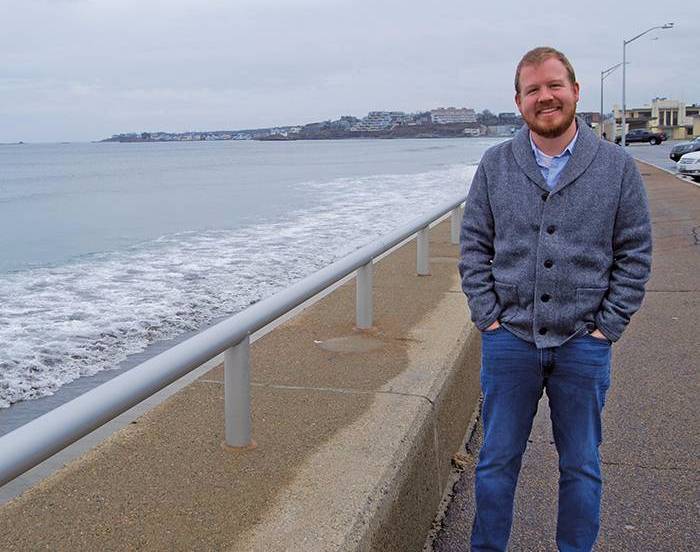Reshaping an Epidemic Locally: Michigan Public Health Alum at the Front Lines of Opioid Crisis

Chris Cobb
MPH ‘13, Health Behavior and Health Education
Since graduating from Michigan Public Health in 2013, Chris Cobb, MPH, has done community health work in HIV prevention, researched kidney disease treatment, and worked in a municipal health department managing public health grants. His latest challenge, and his biggest to date, is the opioid epidemic. Cobb works in eastern Massachusetts, just south of Boston in Quincy. "The opioid epidemic has impacted our communities so tremendously here that the Commonwealth of Massachusetts is putting a lot of resources into its public health response," says Cobb. A good thing in many ways—but an indication, too, of just how severe the problem has become across New England.
Cobb's employer, Bay State Community Services, has a contract with the Massachusetts Department of Public Health to support organizations that receive state grants to work on the crisis. The community services offered by Bay State are wide-ranging and include behavioral health services, such as clinical therapy for patients with mental health concerns. Cobb's part of the team that does prevention work—including technical assistance and outreach support to community partners, and using research and public health data to utilize resources efficiently.
"It's a complicated epidemic, and we look at all kinds of data to understand what's happening and to make decisions." For example, this past spring Cobb and his team reviewed every death certificate in the municipal records from 2014 to 2016, flagging any death in which substances were listed in the toxicology report. They ran those results against other information they had—sex, occupation, race, socioeconomic status—to look for trends. They also did focus groups with community members to see if the data held up to narratives from individuals who had lost a family member to an opioid-related death. This gave them a good picture of who in the community was most at risk so they could put their outreach and prevention resources into reaching those segments of the population.
Cobb is always looking for a connection with the general public—whether through an anecdote or a key data point—to bring them into the crisis at a more personal level. "It's my favorite part of the job—working with people in my community who care deeply about other people in the community. Once they express that deep concern, they are extremely receptive to the information and resources we share and often will seek additional training as volunteers."
"Everything I do is a collaboration of one kind or another. Nothing I do is in isolation.
Every day I work with many people to make important decisions in public health, and
we work as a team to accomplish our goals."
—Chris Cobb
A major challenge in outreach efforts is changing the way people think about substance use and addiction. "Stigma is always present and manifests itself in surprising ways. It's a dynamic and challenging process to effectively address it. Negative attitudes do still exist—about 'junkies' or 'addicts' or other demeaning terms used to describe people who are suffering and who are patients in the care of our medical system—though this is changing over time. Progress has been made in this regard, and my work has benefited greatly from the hard work that's been done by advocates and others to address stigma about substance use and addiction."
Cobb uses a variety of methods, including social media, to work against these stigmas but says personal relationships remain the most effective. "We encourage people in the community, and especially people who work on our team, to meet and get to know people in recovery. They soon find that these are human beings who have a chronic disease, human beings who want to get better. The humanity of people who are recovering from addiction can change hearts and minds."
Cobb and his team get lots of help from the community. He tells a story about a local woman who works as a crossing guard for a school district. "She came to a meeting we held because she cared about the issue and has become deeply passionate about it. She now reads scientific journal articles to understand the crisis at a deeper level." Cobb calls this "citizen science," where the research produced at a place like Michigan Public Health meets people in their everyday lives. "It's a great way to maximize resources—encouraging the ongoing education of local ambassadors for science who can help share our messages about combatting an epidemic by using public health science and data-driven responses."
Entire organizations have stepped up as well, including local police forces. "Police leaders realized quickly that we can't arrest our way out of an epidemic. Our colleagues in law enforcement are now among our most important partners and advocates. They understand the nuances of what happens with addiction, and do their best to improve the situation for those suffering, rather than exacerbating the problem," says Cobb.
Cobb says the Michigan Public Health curriculum helped him develop the broad skill set in social science research and scientific communication that he uses daily. "My graduate program gave me some flexibility, so for electives I took all sociology doctoral courses with mostly PhD students. It is extremely valuable to me in this job to have fine-tuned my technical skills as a student, and it also gave me invaluable tools to understand issues like stigma in a really deep and nuanced way."
Cobb also values the explicit interdisciplinary approach of his professors in the School of Public Health. "Everything I do is a collaboration of one kind or another. Nothing I do is in isolation. Every day I work with many people to make important decisions in public health, and we work as a team to accomplish our goals."
This article first appeared in the fall 2017 issue of Findings, the magazine of the University of Michigan School of Public Health.

- In Boston on September 18? Meet representatives from Michigan Public Health at the Boston Public Health Powerhouse.
- Learn more about Health Behavior and Health Education at Michigan Public Health.
- Interested in public health? Learn more here.
